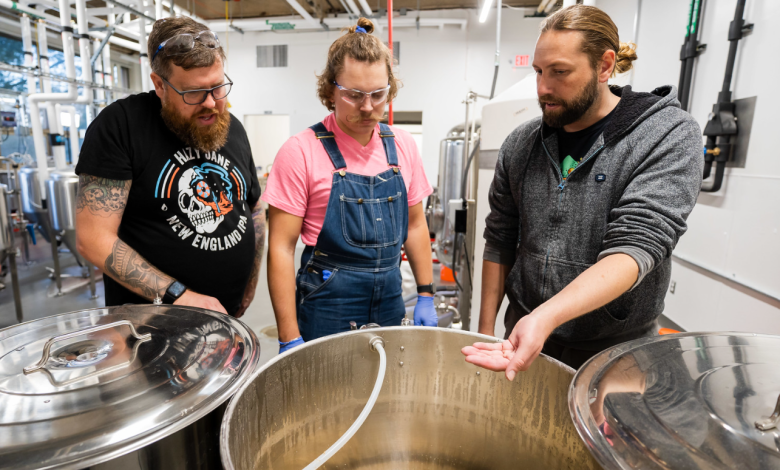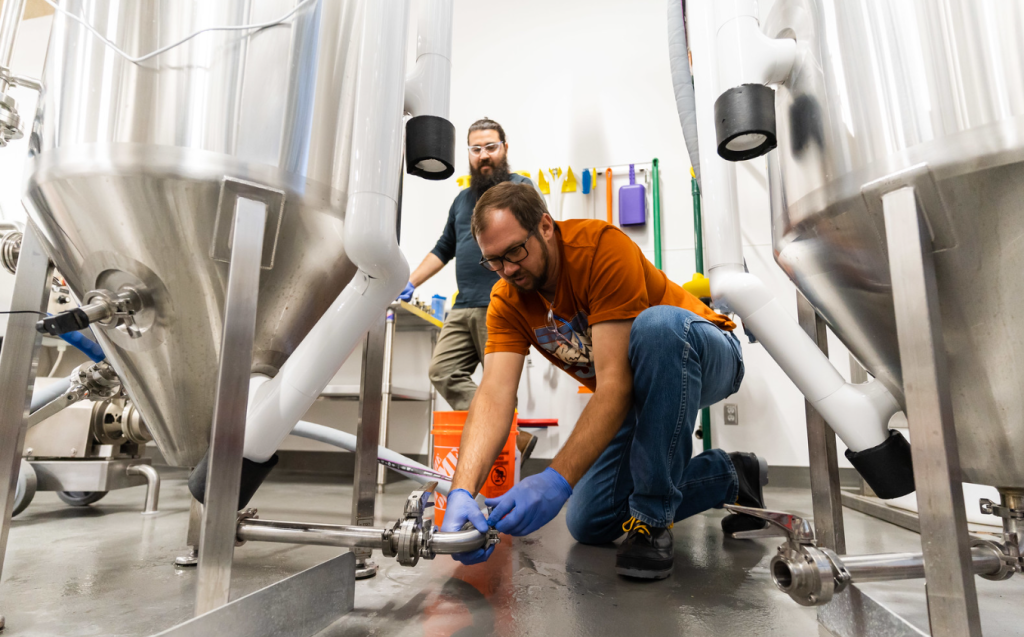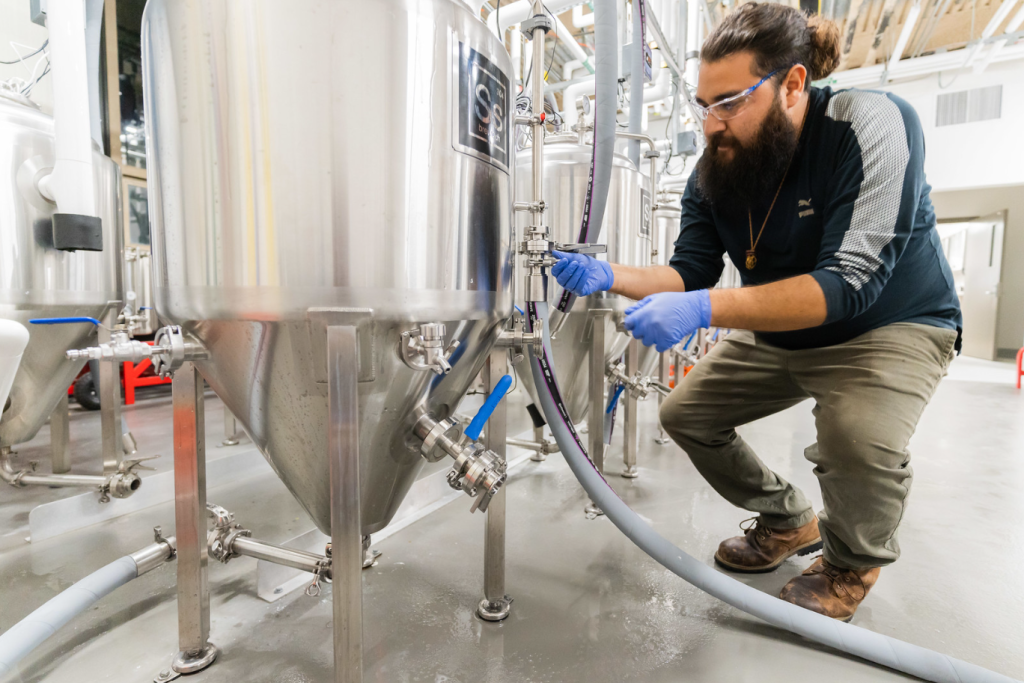
The 2010s were a time of massive growth in the San Diego County brewing industry. Over that decade dozens of new breweries—many of which are still in operation today—opened at an unprecedentedly rapid clip, while established, successful brewing companies expanded, upgrading their manufacturing capabilities while opening additional locations, including scores of satellite tasting rooms. The boom was impossible to ignore, and a faction that not only took notice, but took action, was the higher-education sector.
By 2013, the county’s two largest colleges had launched programs designed to prepare enrollees for careers in the brewing industry, San Diego State University’s Professional Certificate in the Business of Craft Beer, and UC San Diego Extension’s Brewing Certificate. Both institutions teamed with personnel from local brewing companies, suppliers, vendors and industry professionals, involving them as board members, advisors and, most notably, instructors. Doing so was key to the strength, legitimacy and success of both programs, both of which are still going a decade later, albeit heading in different directions.
While SDSU’s program is going strong, UC San Diego recently announced it would discontinue its Brewing Certificate courses in 2024 due to a steady decline in enrollments over the past few years. When asked about the college’s decision, Program Manager Kyle Wiskerchen said that, while it was disappointing, he could take solace in the fact that other local educational institutions were providing high-quality brewing-industry-related preparation, including SDSU and MiraCosta College with its BrewTech, which is in its fifth year and owns the distinction of being the county’s only curriculum certified by the Master Brewers Association of the Americas. Wiskerchen also noted a third, lesser-known program, San Diego Mesa College’s Associate of Science in Fermentation Management.
Though the newest of the local programs, “FERM”, as it’s affectionately known, has been a long time coming. The program was developed in 2016 by the college’s Hospitality and Culinary faculty and an advisory board of professionals in the education, beverage and hospitality industries. Their plan was to develop a curriculum steeped in hands-on experiences provided at an on-campus brewing and fermentation lab. Though delayed by the pandemic, construction of that facility—which was developed with the assistance of Miramar yeast supplier, White Labs—was completed last fall. Now, FERM is in the midst of its second semester and making full use of its capabilities.

“The ability to have both the classroom and the brew lab in the same unit really makes this a unique learning environment. We can lecture about ingredients one night, then go and brew with those ingredients the next night,” says Adjunct Instructor Brian Crecely (pictured above), who is also Head Brewer for Kearny Mesa’s Kilowatt Brewing. “We can brew multiple batches while switching just the yeast or hops, and that really highlights the importance of each individual ingredient. This also ensures that we are sampling and testing products made with fresh ingredients, as opposed to bringing in store-bought samples that may have off-flavors.”
Mesa’s beer production laboratory is equipped with 12 one-barrel Unitanks, a keg-washer, draft-line system and a lab dedicated to measuring fermentation and conducting yeast cell-counts. It is the second on-campus facility of its kind in the county, joining MiraCosta.
“Tactile learning is a big advantage here. It can be pretty difficult to understand how the CIP process works just by reading about it. Being able to learn about the chemicals and different pump types, then physically connecting the hoses and inspecting vessels before and after cleaning cycles makes it easier to understand,” says Fred Hollman. A veteran brewer who worked at local operations, AleSmith Brewing and Groundswell Brewing, before coming aboard at Mesa to spearhead FERM’s everyday operations.
“Speaking as someone who spent years working my way up within a brewery, I understand how difficult it can be on the employee and the employer. We want to help streamline that process so the employer is starting off with a qualified individual, and the employee is starting off on their career path.”

FERM will soon launch a new Brewing and Cellaring Certificate designed to cover fundamentals required for entry-level brewery and cellar staff. Required courses include the following, all of which are offered during the spring and fall semesters.
- FERM 101: Introduction to Yeast and Fermentation
- FERM 130: Flavor and Form
- FERM 140: Beer Production Laboratory
- FERM 160: Retail and Marketing Laboratory
Faculty for the courses include Hollman, Crecely and Kevin Rhodes, who is the owner of Groundswell, a veteran restaurateur and former instructor at The Art Institutes. Students can also obtain work-related credits to be applied toward the certificate by interning for breweries through the program.
“One of our goals is to be able to work directly with breweries to keep our curriculum current. As the industry evolves, we want to stay in tune with the needs of the employer and adjust our curriculum to meet these needs,” says Monica Romero, Mesa’s Dean of Business and Technology. “Whether it’s a brewery reaching out for potential employees or sending their current staff to us for training, our goal is always to support student success in the workplace.”
To that end, Mesa will present a hosted FERM open house and networking event at its lab for members of the brewing industry. It will take place on Thursday, October 12 from 2 to 4 p.m. at Mesa’s lab facility. Those who would like to attend can register for the event online.
Meanwhile, those interested in learning more about FERM can refer to Mesa’s website or reach out to Hollman via email with questions.

